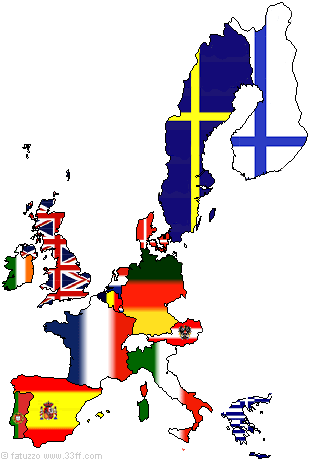9 countries joined the Schengen area
On December 21, 9 countries – EU members: Slovakia, Slovenia, Hungary, Czech Republic, Poland, Malta, Latvia, Lithuania and Estonia – joined the Schengen zone.
From now on, on the land and sea borders between these countries and 15 states that are already in the zone, border control has been removed. However, the removal of control at the air borders for new Schengen members will not enter into force until March 30, 2008.
The Schengen agreement on border controls on internal borders between European countries, named for the town in Luxembourg, was signed in 1985. In addition to new members, Belgium, Luxembourg, the Netherlands, Germany, France, Italy, Spain, Portugal, Greece, Austria, Sweden, Finland, Denmark, Norway and Iceland joined the treaty.
Eastward expansion
Russians will be able to travel on a Schengen visa to another 9 countries
On December 21, the long-awaited expansion of the Schengen zone took place for several East European states. Now with a single visa it will be possible to enter the Czech Republic, Poland, Latvia, Lithuania, Estonia, Slovakia, Slovenia, Hungary and Malta.
Previously, an appropriate visa could only be used in Germany, France, Italy, Greece, Portugal, Spain, Austria, Sweden, Denmark, the Netherlands, Finland, Norway, Iceland, Belgium and Luxembourg.
If you look at the map of Europe, it is easy to see that now the Kaliningrad region has been cut off from the main territory of Russia by the “Schengen zone”: Lithuania from the northeast and Poland from the southeast. What consequences does this threaten the Russians? Politicians, diplomats and business representatives promise that there will be no innovations.
Russian President Vladimir Putin told reporters about this at a press conference in May 2007, which took place immediately after the Russia-EU summit in Samara. The President said that the order of trips to the Kaliningrad region and to Russia from the region will remain unchanged. Moreover, Putin announced the intensification of negotiations on the possibility of visa-free travel between EU countries and Russia. And from June 1, an agreement between Russia and the European Union on facilitated visa issuance entered into force.
Foreign Ministry spokesman Mikhail Kamynin in his statement also focuses on the positive consequences for the Russians of the expansion of the Schengen zone. For example, on the basis of a visa issued by “newcomers”, it will be possible to move around all countries of the agreement. Kamynin refers to the “victims” only those Russian citizens who are on the Schengen “black list”: now they are denied entry to another nine countries. Kamynin also promises a successful outcome of negotiations with the EU on a joint visa-free entry, but emphasizes that this is a “not tomorrow” issue.
Spokeswoman for the Russian Union of Travel Industry Irina Tyurina called the accession of nine new countries to the Schengen agreement convenient for Russian tourists, especially in terms of popular combined trips. For example, for a bus tour to Austria and the Czech Republic you will have to apply for not two visas, as before, but only one. In addition, the rules for obtaining a visa to new Schengen countries have long been brought into line with general requirements, so neither the questionnaire nor the set of documents will change.
Poles celebrate entry into Schengen
The cost of obtaining a Schengen visa is 60 euros (for Russians it is 35 euros). Euro visas are more expensive than national visas to enter certain countries of Eastern Europe. Thus, the accession of these countries to the agreement will hit the pocket of those CIS residents who often visit these countries by occupation. Some experts believe that Western and Central European countries will have a suspicious attitude towards visas issued by new Schengen members, since the consulates of Eastern European and Baltic countries are more loyal in issuing entry permits.
As for the Kaliningrad region, until 2003, entry there for Russians in transit through Lithuania was visa-free. In December 2005, a transit Lithuanian visa acquired an external resemblance to a Schengen visa: a color photograph of the recipient appeared on it. The Consulate General of Lithuania in Kaliningrad issues these visas to residents of the region free of charge. Representatives of the consulate explained the transition from previous visas without photographs to new ones with the already planned accession of Lithuania to Schengen at that time.
On December 10, 2007, Lithuanian Consul General in the Kaliningrad Region Viktoras Baublis told Russian reporters that since 2003, about a million simplified free visas have been issued. Baublis confirmed that the agreement between Russia and Lithuania will remain in force. True, the accession of Lithuania to the Schengen does not give additional rights to holders of a transit visa, they will not be able to enter other European countries through it.
Currently, there are two ways to travel through Lithuania. A railway transit visa is given to passengers traveling from Moscow, St. Petersburg, Chelyabinsk and Adler to Kaliningrad and vice versa. At the same time, the visa holder cannot leave the train. For other types of transport, a 24-hour restriction on staying in Lithuania is established, and you need to move around the country only in a certain direction.
Some media outlets express concerns that the EU countries will require Lithuania to issue transit Schengen visas for Russians traveling to and from Kaliningrad, and then an additional 35 euros will have to be paid for such a trip. However, these fears are not consistent neither with the statements of the Russian president, nor with the point of view of Lithuanian diplomats, therefore they do not deserve a serious attitude.
On December 20, the newspaper The Times published an article in which Kaliningrad was called “Putin’s Hong Kong.” Indeed, state support for the region favorably affects its development. In 2006, the Kaliningrad region showed the highest rates of economic growth among all Russian regions.
Since 2006, a six-year exemption from income tax has been in force for new investors, due to the special economic status of the region. A large number of construction projects are being implemented, a new airport terminal has been opened. Eight million tons of cargo per year passes through the seaport of Kaliningrad, because it is the only ice-free port of Russia in the Baltic.
Since 2009, Kaliningrad will become one of the four Russian zones where gambling will be officially allowed. In this regard, a casino is being built in the city, as well as hotel complexes with a total of 30 thousand rooms. Gambling is expected to attract more Russian and foreign tourists to Kaliningrad.
Naturally, with such great hopes placed on Kaliningrad, the agreement on simplified transit through Lithuania is strategic for Russia, and it is in the interests of the authorities to maintain the existing order, despite Lithuania entering Schengen.
This post is also available in:
 English
English  Русский (Russian)
Русский (Russian)





